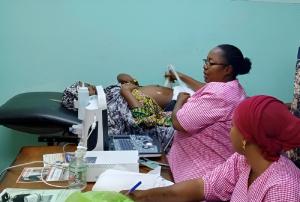In Burkina Faso, improving access to obstetric care is a major strategic focus in the efforts to curb maternal mortality. An initiative has been introduced: training midwives in basic obstetric ultrasound during antenatal consultations to improve pregnancy monitoring—particularly in remote areas where specialists are hard to reach. Obstetric ultrasound is a key tool in antenatal care to determine gestation date, detect foetal abnormalities, detect ectopic pregnancies, assess foetal growth and determine the most suitable delivery method.
In 2021, the Ministry of Health launched a pilot programme in eight health districts in Boucle du Mouhoun and Hauts-Bassins regions.
“In the past, pregnant women monitored at our centre had to go elsewhere to get an ultrasound. This caused delays in diagnosis, extra costs, and sometimes avoidable complications,” says Denise, a midwife and head of the maternity ward at the Sakaby Urban Medical Centre.
Denise, along with 17 other midwives, received specialized training in basic obstetric ultrasound in November 2023. “This initiative is a game-changer because early detection of complications is essential for the safety of both mother and baby,” she explains. Following the training, she and her team performed over 2000ultrasounds tests between January 2024 and March 2025, and 10 high-risk pregnancies were identified and managed in time.
“Easy access to ultrasound is of strategic importance, both in terms of public health and socio-economic development. Ultrasound enables early and noninvasive diagnosis of abnormalities, allowing for timely care,” explains Dr Moussa Dadjoari, Head of Women, Men and Elderly Health Services at the Ministry of Health’s Family Health Directorate.
The Sakaby Urban Medical Centre also recorded the highest number of antenatal consultations and deliveries since the start of the project, with over 1300 antenatal consultations and deliveries November 2022 and October 2023.
The initiative is part of a broader drive to improve maternal care quality, alongside other measures such as free healthcare for pregnant women and children under five, including childbirth-related care, free access to family planning, enhanced community health through targeted health promotion and prevention for pregnant and postpartum women, and better management of obstetric complications.
The project was made possible through funding from the Sexual and Reproductive Health Project, which supported the development of a training manual for ultrasound and the training of trainers.
Dr Jean de Dieu Sanou, a gynaecologist-obstetrician at Sourou Sanou University Hospital in Bobo-Dioulasso and one of six trainers recruited for the project, welcomes the results but highlights areas for improvement. “Although the training duration for midwives was relatively short, it provides useful basic knowledge in underserved areas. The lack of ultrasound can lead to late diagnosis of serious conditions or missing multiple pregnancies altogether.”
WHO recommends one ultrasound before the 24th week of pregnancy to optimise antenatal follow-up. This approach not only reduces risks for mother and child but also strengthens women’s trust in the health system. “For this recommendation to become a reality, it’s vital to invest more in staff training, health facility equipment and community awareness,” says Dr Ramatou Sawadogo Windsouri, head of the maternal and child health programme at the WHO office in Burkina Faso.
WHO has provided strategic support to the Family Health Directorate to engage professional bodies, particularly obstetrician-gynaecologists, midwives and radiologists in promoting acceptance. WHO also supported the development of a training manual tailored to the Burkina Faso context.
Nevertheless, challenges remain. In most health centres, only one midwife has been trained, making the service unavailable in their absence. Supply shortages have aso been reported.
WHO and the Ministry of Health plan to extend the project to other districts, with support from the World Bank. The goal is to make basic prenatal ultrasound an essential service accessible to all pregnant women, wherever they live. By bringing ultrasound into public health centres, inequalities in access to care are reduced and lives are saved.
World Health Organization







OTHER ARTICLES
Editorial — Prevent, inform, and act for women’s health in Africa
Kenya : Government Prioritises Maternal Health and Strengthens Support for Community Health Promoters
Strengthening pandemic prevention, preparedness, and response capacities in Senegal using the “One Health” approach